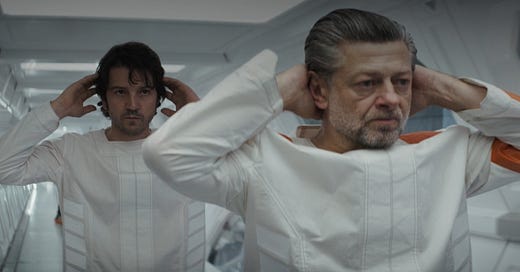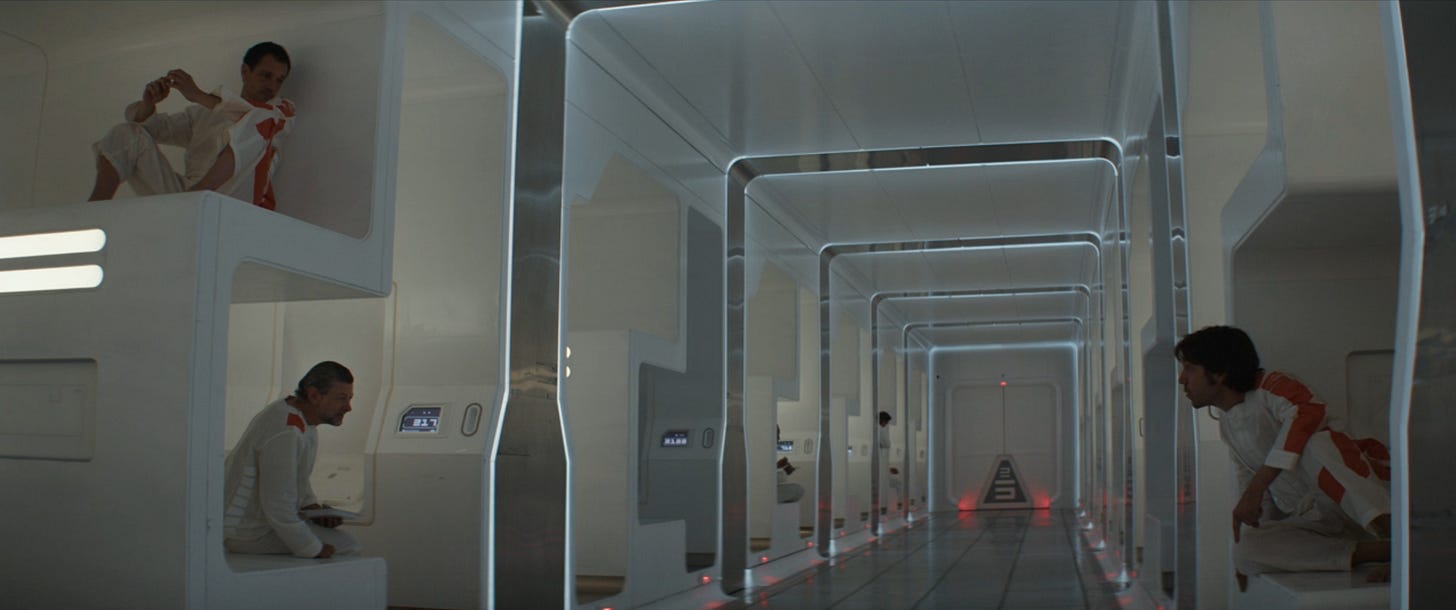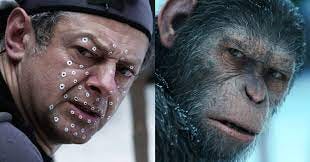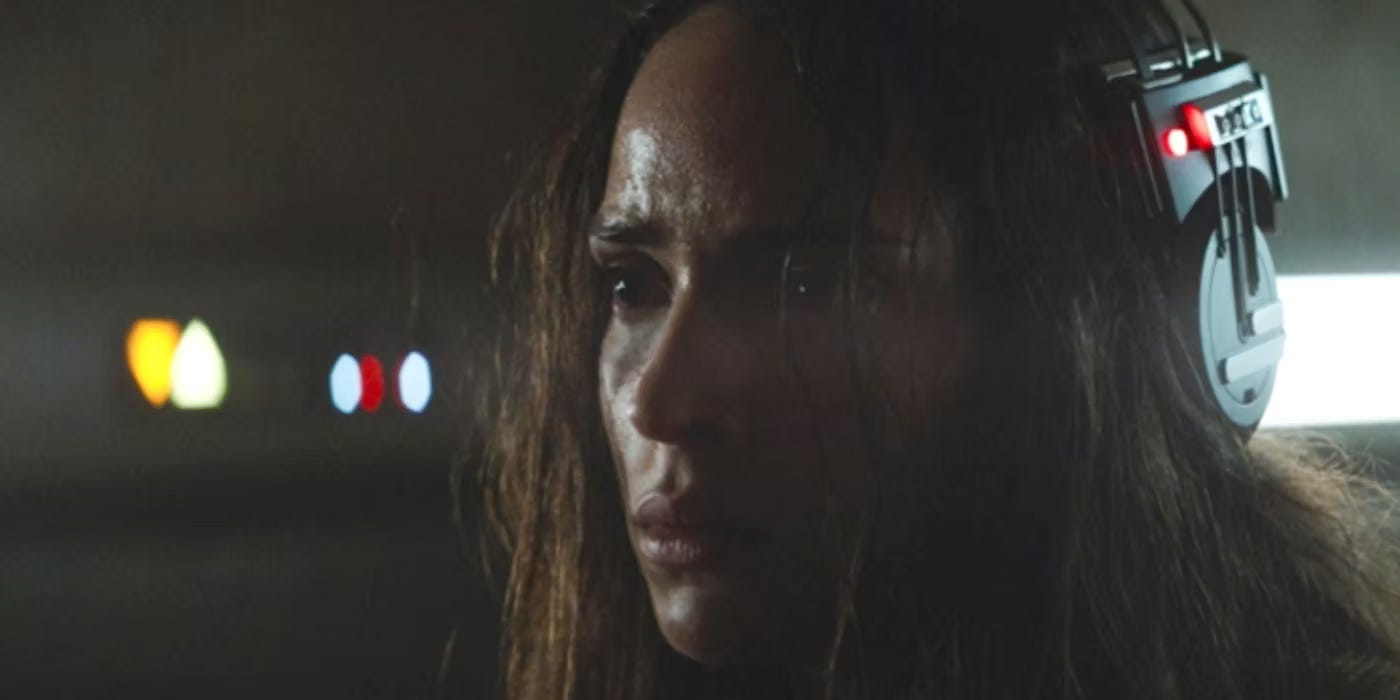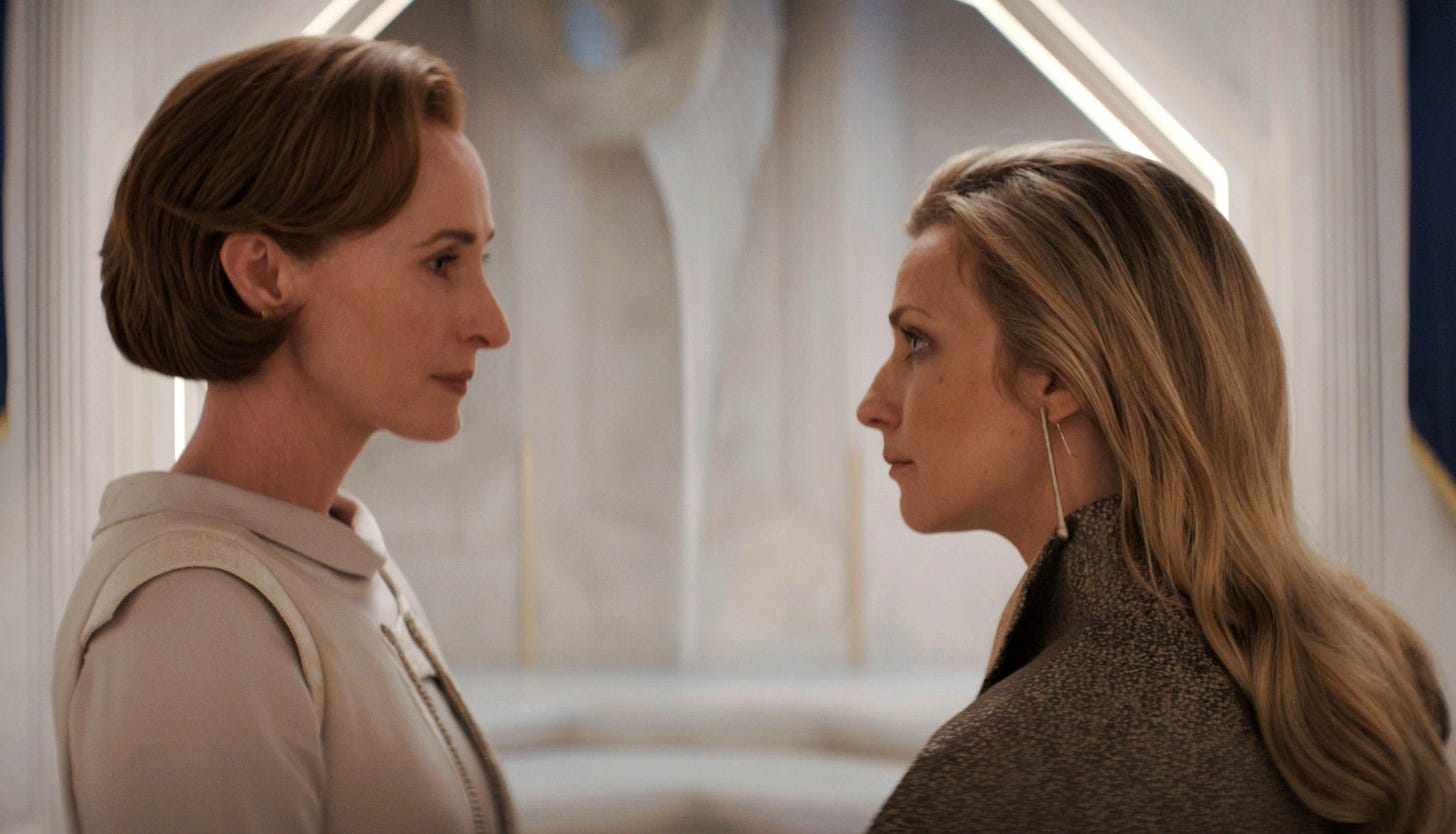The Short Take:
Even though Episode 9 isn’t the climactic episode of this arc, it still offers big dramatic moments and revelations. Andy Serkis cuts through a chorus of outstanding performances.
[SPOILER WARNING: How many spoilers are on each level? Too many.]
The Long Take:
“Never more than twelve.”
This was a big week for Andy Serkis.
Yes, I know that the torture scenes with Bix and Dedra were harrowing. And I’m going to talk about them. But, for me, Andy Serkis’ Kino Loy is the headline coming out of this episode because his storyline went in a completely different direction than I expected, and Serkis sold this new character to me 110%. So much so that I’ve spent all my pre-writing time consumed by one question: what makes him SO good? Critics and fans all seem in agreement that he’s phenomenal here. But why?
The sharp writing surrounding his character certainly helps. It’s hard to beat the impactful last line of the episode. When Cassian asks him for the umpteenth time, “How many guards are on each level?”, Kino finally answers with “Never more than 12.” Then we immediately know it’s game on. This is so representative of what I’m loving about this show, especially the writing. Very few revelations are explicit; most of them are subtextual and reward me for having paid attention to past conversations. Kino doesn’t have to say, “I’ve had a change of heart, let’s break out of this joint,” but since we see Cassian interrogating him to find out all he knows about the prison before he gets out in 217 shifts, the significance of a different answer and the signal that answer sends about Kino’s shifting perspective makes his utterance of a simple fact, “Never more than twelve,” like a Vuvuzela at the World Cup Finals.
Ulaf’s tragic death is clearly the catalyst. The prospect of his own and others’ eventual release is the one idea Kino clings to; it’s what has kept him going this entire time. Early on in the episode, when he realizes that Ulaf, with 40 shifts left, is the next man out, he is so kind and encouraging to him. Ulaf’s death snuffs out that light at the end of the tunnel because Kino learns that the guards placed a released prisoner on another floor rather than actually letting him go.
Serkis’ genius acting, however, allows us to see this as a gradual change of heart and mind. Sure, Ulaf’s death is the straw that breaks the bantha’s back, but the events of the episode leading up to that point were always already priming him for recruitment to Team Prison Break. We only know this, though, because Andy Serkis tells us with his face every time there’s new input from his environment, new information that he has to process. After Cassian says, “They don’t need to care. All they need to do is turn on this floor twice a day and keep their numbers rolling,” the camera cuts to a close-up of Kino’s face as he looks down, clearly thinking about what Cassian has just said. When he looks up, we can see that Cassian has chipped away at his prickly exterior just a tiny bit, at least until Kino shakes his head to dismiss Cassian once again.
This comment from Cassian, incidentally, reminds me a lot of his roasting of the Empire in his Episode 3 conversation with Luthen: “They’re so fat and satisfied…they can’t imagine it. That someone like me would ever get inside their house.” He’s using the same logic here. The guards on Narkina 5 are so fat and satisfied — and so hands off — that they’ll never see an escape attempt coming. Diego Luna also does an excellent job in this scene, laying on the charm and then getting so frustrated that Kino is still worried about the Empire listening to their conversation. This is obviously an important enough idea that the writers have named the entire episode “Nobody’s Listening!”
We’ve almost exclusively been listening to Andy Serkis all these years. The British actor of Iraqi and Armenian descent has had a singular — some might say strange — acting career because the roles he’s the most known for have been motion captured or “mo-cap” CGI characters with completely different, non-human faces: Gollum from Peter Jackson’s The Lord of the Rings trilogy, Supreme Leader Snoke in the Star Wars Sequel Trilogy, and Caesar from the Planet of the Apes reboot films, to name a few. While his work in these roles and has revolutionized moviemaking history for the better, the average moviegoer would not recognize him unless they, like me, like to watch behind the scenes documentaries.
Image Credit: British GQ
Though, it’s not as if we’ve never seen Serkis’ face. Most recently, he’s appeared as Alfred in Matt Reeves’ The Batman (2022); I didn’t think I could let go of Michael Caine’s indelible performance in that role, but Serkis held his own for me and I very quickly embraced him as my new Alfred. He was also, less memorably, the secondary villain in Black Panther (2018), Ulysses Klaue. This week’s episode of Andor, however, could serve as a turning point for Serkis’ career. He hasn’t been given an opportunity to shine quite like this, and I thought he rose to the occasion in every way.
I suspect that Serkis’ extensive work with motion capture enables him to give the kind of performance we see here in Andor. He’s had to have such an expressive face because the little nodules stuck all over it, like tiny starfish hoping to hitch a ride to the next tide pool (I’ve obviously been reading The Snail and the Whale with my kids again), need to pick up enough movement for the animators to use. I’ve seen him crouching like Gollum in BtS footage, so I know mo-cap is a full body performance. But when I think back to what made Gollum so hauntingly pathetic, I remember his face, especially when it changed from Sméagol to Gollum and back again.
Image Credit: Vulture
When we met Kino Loy last week, I thought I had him pegged. He was the traitor to the other prisoners, seduced by the twisted reward system set in place by the panopticon for hands off the wheel self-regulation. He was going to be an obstacle to Cassian’s escape, I thought. He seemed so intensely committed to order (And, as Syril says, one can never be too aggressive in preserving order.) and making everyone keep their heads down so he could make it to the end of his sentence. The writing of Kino in “Nobody’s Listening!”, combined with Andy Serkis’ career-altering performance, rendered an expectation-defying depth to Kino Loy. He’s still gruff and ordering everyone around, but the facial expressions we see in between the barks belie his actions and his attitude towards his fellow inmates. The way he interacts with Cassian, veiled with curt retorts about keeping his “flap shut” or “you know the drill” evinces mutual respect. He never belittles anyone or threatens them in earnest. He, rather, highlights the threat of the Empire and the Narkina 5 guards when he says “you’ll regret it.”
He’s much more like the captain of a ship who’s a hard ass to keep everyone in line but ultimately feels responsible and, in his own way, cares about all of his men. When the men, trapped in the hallway, start to panic at the rumors about Level 2 flying about, he very clearly seems — again, it’s on his face — scared, but pulls himself together enough to give the men a pep talk about how there are rumors but they shouldn’t assume the worst. He’s not like the ISB officers we see in the Ferrix scenes, and I would not have said that last week.
Those ISB officers, we learn, are even colder and crueler than I imagined possible, as they give us what many have called the scariest, most difficult to watch scene in all of Star Wars. Dedra and Doctor Gorst’s less violent, less invasive, yet doubly deranged tactics remind me a lot of what I observed last week with Narkina 5’s panoptic set-up. No one’s beating anybody for information. As far as we can tell, Bix never bleeds the entire time she’s in Imperial custody. Instead, Doctor Gorst has taken the dying cries of an alien species’ children and turned them into a torture device. All it takes is a headset gently placed upon Bix’s ears to get her to talk. Adria Arjona does amazing work in this scene; her reaction is so visceral and goes through many stages of fear, resistance, and torment.
Image Credit: Collider
What’s more, we learn from Doctor Gorst that the species from which the torture sounds have been derived, the Dizonites, were wiped out from their home, an outer rim moon called Dizon Fray, because the Empire wanted to build a refueling station there. The story Gorst tells reminds me all too well of Aldhani and what the Empire is in the process of doing to its people there. The writers could have very easily told this story as more of an isolated mad scientist discovery, without mentioning the Empire refueling station, rather than the byproduct of colonial occupation and genocide. The addition of these details compounds the brutality and horror of the scene and connects it to the series as a whole. That is, the Empire’s vast reach and these connections between places upon which the Empire has inflicted pain and suffering with consistent methods makes the Star Wars Galaxy in Andor feel potently cohesive.
As predicted, this episode complicates my feelings towards Dedra considerably, as I found myself rooting for her in previous episodes. She’s completely ruthless here, and seems to derive pleasure from intimidating and torturing Bix. That’s obviously reprehensible. And yet, I like that she’s smart and ambitious. She is quickly becoming one of my favorite Star Wars villains, and is already my favorite Imperial Officer, not counting Alexander Kallus or “Hot Kallus” from Rebels. When she says, “The worst thing you can do right now is bore me,” she gives me the heebie-jeebies.
Because I’ve glommed onto Dedra in a way that I never have with an Imperial Officer before, and I would 100% support her if (IF!) she weren’t an evil fascist, I want to make it clear that I do NOT ship Syril and Dedra. Lots of folks (I’m looking at you Steve Alhman of the Ringer-Verse and David Chen and Patrick H. Williams of Decoding TV, all critics I enjoy and respect) celebrate what they perceive as palpable sexual tension between the two. Williams, in fact, made this amazing video montage of Syril and Dedra as if they were in an 90s rom com. Up until this episode, I would have been amused by and open to this.
But after the scene in which Syril stalks Dedra at her place of work, misinterprets her interactions as undue amounts of favor towards him, and intensely professes his “admiration” for her, I feel as though any romantic relationship that may form between the two of them will communicate to the audience that this behavior is not only acceptable but effective in pursuing a romantic interest. If it turns out that Dedra is false-protesting and threatening Syril when really this whole time she’s been into him, I’m going to be very disappointed and wonder if the series is inadvertently undermining her character. Plus, she’s wayyyy out of Syril’s league. I want better for her (again, I acknowledge that she is an evil fascist).


I’m going to confess that despite Dedra and the ISB being supremely evil this episode, I still found the emergency meeting scenes to be mesmerizing, and I caught myself thinking, “Yes! They’re piecing it together. Oh wait, they’re the bad guys.” This scene had an investigative thriller momentum that drew me in. I’m a big West Wing-head, and I think the part of my TV-viewing brain that derives pleasure from that show is the same that desires pleasure from this scene. I love seeing characters collaborating to figure things out. I love lightbulb moments. The notable mention of Anto Kreegyr — the Separatist that Luthen tries to get Saw Gerrera to meet with — makes me think that a.) we may see Saw again or at the very least this loops Luthen back in a dangerous way and b.) Anto Kreegyr has to be played by a known actor. He’s shrouded in too much mystery for too long for there not to be some kind of reveal of him on screen. Then again, I’ve been wrong before, and have loved Andor’s bucking of my expectations.
Interestingly, before the series started, I wanted and half-expected the Mon Mothma thread of the story to feel like The West Wing, with lots of political walk and talks, briefings, and tense meetings. We’re definitely getting tense meetings, but they’re much more adorned in luxury and hushed in secrecy because we’re focusing mainly on Mon’s undercover activity rather than her out in the open political work. I’m once again running out of time and space to gush about Mon Mothma, but I found the revelation that Vel is her cousin to make TOTAL sense, and I love how this makes Mon Mothma slightly less alone in the Galaxy. She finally has someone she can safely relate to and confide in, no strings attached. The looks she gives during their dinner conversation told me that she knows about Vel’s sexual orientation (when maybe no one else does) and that she is impressed (“No one accuses me of being tedious.”) and endeared by her cousin (“All the good ones were taken.”)
All these dialogue gems build towards Vel saying, “We’ve chosen a side…we’ve decided to make something of our lives.” This indicates that she and Mon are aware that they can and should use their class privilege to try to make a difference rather than idle away, comfortably removed from it all. A powerful message for all of us sitting at home with our cozy couches and Disney+ subscriptions.

